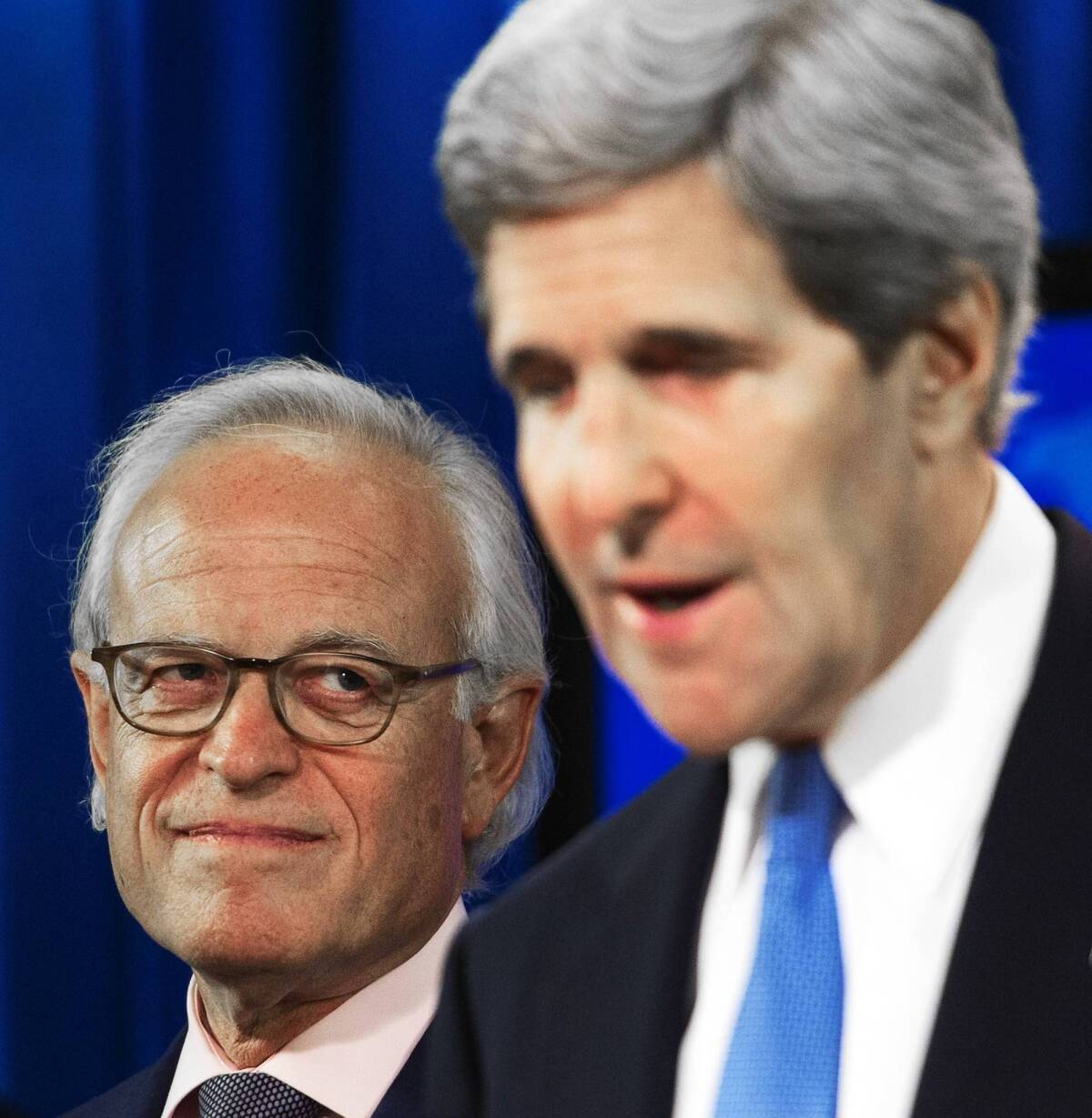U.S. peace initiative’s fate hinges on Israeli, Palestinian leaders

JERUSALEM — Israeli Prime Minister Benjamin Netanyahu and Palestinian Authority President Mahmoud Abbas weren’t in the room Monday when preliminary peace talks resumed in Washington.
But the fate of Secretary of State John F. Kerry’s initiative depends on the political courage and fortitude of these two leaders.
Better known as cagey strategists than risk takers, Netanyahu and Abbas will each need to overcome considerable political opposition from within their ranks, a deeply pessimistic public and a mutual distrust that some fear may be unbridgeable.
“So much depends on the players, not the policy,” said Yossi Beilin, a former Israeli government minister and Oslo peace accords negotiator.
Netanyahu and Abbas agreed under American pressure to send top envoys to Washington, largely out of fear of alienating Kerry or being labeled an obstacle to peace. Rarely has the Mideast peace process resumed under such a cloud of doubt — it usually is accompanied by diplomatic fanfare and expressions of optimism.
The talks began late Monday in Washington with a working dinner to discuss procedural issues. Israel was represented by Justice Minister Tzipi Livni and lawyer Yitzhak Molcho. The Palestinians sent veteran negotiator Saeb Erekat and economist Mohammed Shtayyeh.
Netanyahu has largely avoided even characterizing the initiative as a resumption of “peace talks,” preferring the more oblique phrasing of a “resumption of the diplomatic process.” That’s a far cry from three years ago, when he dramatically turned to Abbas during their last direct meeting and called the Palestinian leader his “partner in peace.”
Abbas, meanwhile, has avoided any public comment, leading some to wonder whether he’s leaving himself an escape hatch.
Wide majorities among both Israelis and Palestinians tell pollsters that they expect nothing will be achieved. Privately, many Israeli and Palestinian officials agree, noting that the differences on core issues remain stark.
“Prospects for success are very, very low,” Beilin said. “It’s almost impossible.... The current gap between Netanyahu and Mahmoud Abbas is such a big one that even if Kerry pushes them a little bit, they will not meet each other, especially on borders.”
U.S. officials are hoping that direct talks will break the logjam. On Monday, Kerry named Martin Indyk, a former U.S. ambassador to Israel, as the new special envoy to oversee talks.
President Obama managed to bring the sides together briefly in Washington in 2010, but the Palestinians broke away a month later after Israel refused to extend its partial moratorium on settlement construction in the West Bank.
After a photo op and handshakes in Washington, a similar collapse may await. But both men already have paid a price to join the process and neither is likely to want to see the effort completely fail.
After insisting for years that he would not resume talks unless Israel halted settlement construction, Abbas is returning with no public commitment from Israel to stop building on land it seized during the 1967 Middle East War.
Similarly, Netanyahu’s mantra for the last three years has been “no preconditions.” Yet Sunday he scrambled to persuade his Cabinet to release 104 Palestinian prisoners as a concession.
Those close to the men say their about-faces reflect the growing international pressure, but also some soul-searching over their legacies.
At 78, Abbas has said repeatedly that he does not intend to run again if and when new Palestinian elections are held. For years, rivals ridiculed his adherence to a path of nonviolence and negotiations.
“To continue negotiations under the same process and under U.S. mediation is futile,” said Khalida Jarrar, a member of the Palestine Liberation Organization Executive Committee representing the more hard-line Popular Front for the Liberation of Palestine. She said Abbas caved on the settlement freeze demand against the wishes of the committee.
But if a peace deal with Israel is reached, Abbas could secure his place as the father of Palestinian statehood and emerge from the shadow of former PLO Chairman Yasser Arafat.
Netanyahu, 63, is younger and could run again. He is already one of Israel’s longest-serving leaders, but as he embarks on his third term as prime minister, some say his greatest accomplishment has been survival.
“Netanyahu wants to make it into history,” said Hebrew University political science professor Avraham Diskin. “He has the three necessary components. He has the will. He has the power. The only one I’m not sure about is the courage, but I think he has that too.”
Netanyahu once was a tough-talking hawk who warned that Palestinian statehood would spell the end of Israel. But he endorsed a two-state solution in 2009 and imposed a 10-month partial freeze in settlement construction later that year. His prisoner-release plan barely passed the Cabinet. He’s had increasing difficulty reining in more conservative rivals in his Likud Party.
If he succeeds in reaching a deal, Netanyahu could secure a place as one of Israel’s greatest prime ministers. But if he stumbles, his political opponents may well take the opportunity to pounce.
Netanyahu found himself in such a situation during his first term as prime minister. His 1998 Wye River agreement with Palestinians, which pledged to turn over control of parts of the West Bank, alienated conservatives. But liberals refused to come to his rescue. His government fell and he lost elections the next year.
Times staff writer Paul Richter in Washington, Batsheva Sobelman in The Times’ Jerusalem bureau and special correspondent Maher Abukhater in Ramallah, West Bank, contributed to this report.
More to Read
Sign up for Essential California
The most important California stories and recommendations in your inbox every morning.
You may occasionally receive promotional content from the Los Angeles Times.










